by ECWA Editorial Board | Upon your arrival at the village, you’ll be greeted by a guesthouse operator who will check you in and set you up with lunch or dinner depending on when you arrive at the village. The food cost varies but usually around 10 cedis for dinner, and is of higher cuisine than you get in most places in Ghana. (Image: Facebook)
Nzulezo is a remote stilt village in Ghana located in the Amansuri wetland and accessible to the public only by dugout canoe from the town of Beyin on the coast about 40 kilometres east of the Ivorian border and 90km west of Takoradi. The village derives it’s name from Nzema, meaning “surface of water” and it’s 300 kilometers from Accra, Ghana’s capital city for many centuries. Nzulezo has coexisted with nature and is a good example of people living in harmony with nature and their environment since the first inhabitants of the Nzulezo migrated from Mali in the 15th century after a war with the Mande people of West Africa over their fertile land and gold.
Getting There
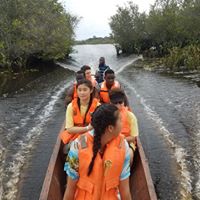
The only way to reach the village is by canoe. Tickets must be purchased from the Ticketing office at the end of the long dirt road. Life preservers are provided but
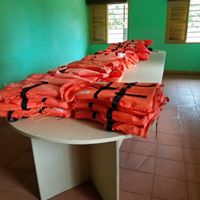
parents may consider bringing their own life vest for their small children. At the beginning of the canoe journey, there is a modern, well-constructed cafe serving drinks, hot food, and European-style coffee. The canoe trip itself is 45 to 60 minutes in duration and very scenic. After you’re there, you are on foot to get to anywhere you wanted to go.
Economy
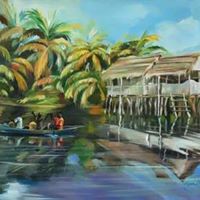
Nzulezo’s main industry is in agriculture. Locals do fish, but that is mainly for their own source of food. By the age of three, all the local children are required to know how to swim. “I didn’t learn how to properly swim I think until I was ten” says Fatimata. The village has three churches and a school for children. When they get to Junior High they have to travel everyday to the nearest town for further education. It’s unfortunate that the village at this point in time doesn’t have a good way to dispose of their trash. Much of their trash is accumulating below their homes and when the water rises during the raining season I’m sure much of it flows into the lake and eventually into the ocean. The village has been designated a UNESCO World Heritage Site.
The Western Region has a whole lot going on. They have rubber plantations that are used for vehicle tires and it covers miles and miles of land. There’s also gold mines. About four years ago, natural gas and oil were discovered near the village. Since then there has been a lot of investment and commotion in the region on the rights to the natural gas and oil. Unfortunately, some of the mining has led to contamination of many of the villages main sources of water. Forcing the villagers have to look for other sources of clean water.
Tourism on Stilts
Numerous canoes, each big enough to carry five adults, carry visitors through the mangrove forest and across Lake Tadane to the village every day except Thursday. Visitors are frequently expected to get involved in paddling the canoes.
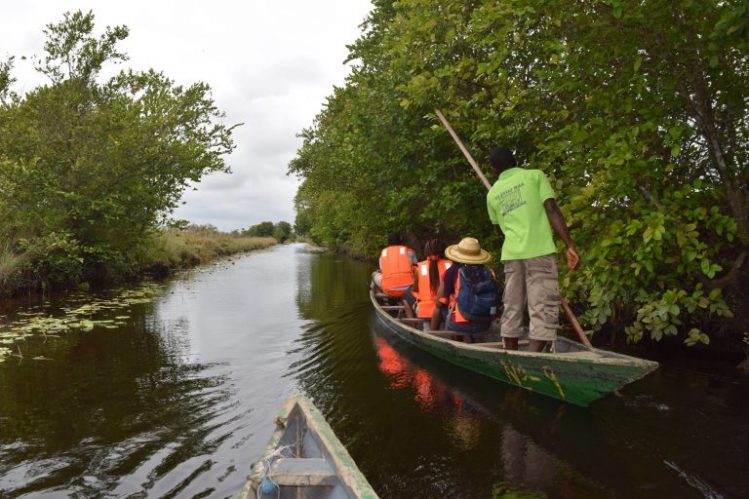
David Blay, or one of several other local tour guides will take you on a tour of the village, enabling you to interact with the locals and allow you to observe their daily activities. Not-very-subtle emphasis is given to the tour of the community’s school, which you’ll later be asked for a donation towards. The school’s blackboards contain what appear to be daily lessons, with the date written at the top of the blackboard. It’s up to you to decide whether all of the smudges around the date (and the lack of smudges around everything else on the board) suggest that all is not what it seems. These days, you can also get to the village in 30mins or less by a powered commercial canoe that can carry up to 10 people.
Where to Stay
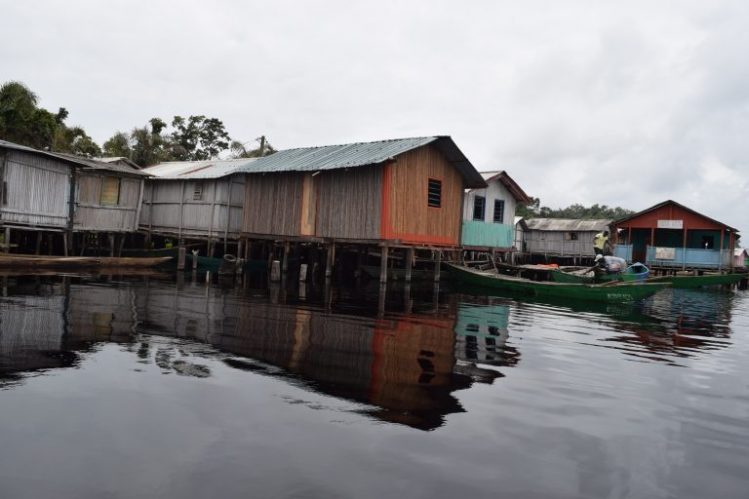
The village has a small guest house. A room with one single bed and one double bed cost around 60 cedis (depending on your negotiation skills). The beds are firm, but have mosquito nets. As of now, there are no 24/7 Healthcare Clinic/Hospital in Nzulezo. However, residents are lobbing local authorities to have a health care facility built for them….canoeing patients to Ghana is not a practical alternative these days.
Eateries & Night Life
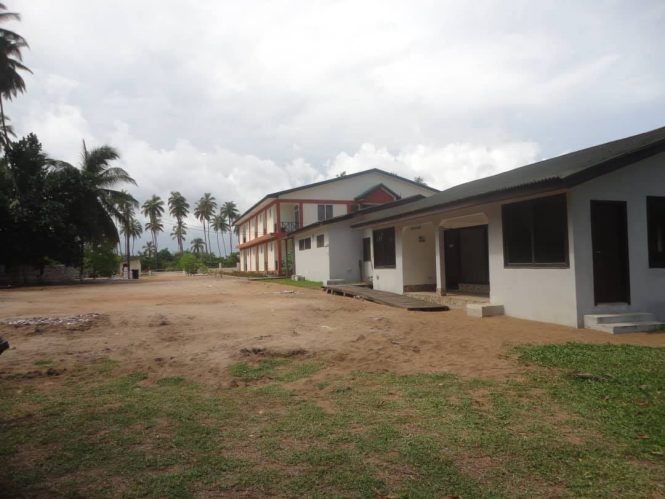
Upon your arrival at the village, you’ll be greeted by a guesthouse operator who will check you in and set you up with lunch or dinner depending on when you arrive at the village. The food cost varies but usually around 10 cedis for dinner, and is of higher cuisine than you get in most places in Ghana. There are also stalls in the village selling omelettes and snacks. Unless you want something specific, there’s no real need to bring your own water or food to Nzulezo. The village has a small “spot” bar that serves beer, spirits, and soft drinks. Since tourism in the village started 20 years ago, city folks travel to Nzulezo just to taste the gin that is indigenous to the place. They feel it is far different and tastes better than other places.
Depending on whether or not the generator is working, prepare yourself for warm beer. The villagers will be pleased if you buy some souvenirs that they hand-carved, for example mini-canoes about 15cm long. Don’t expect these mini-canoes to look like a milled one at the factory.
Educating the Children
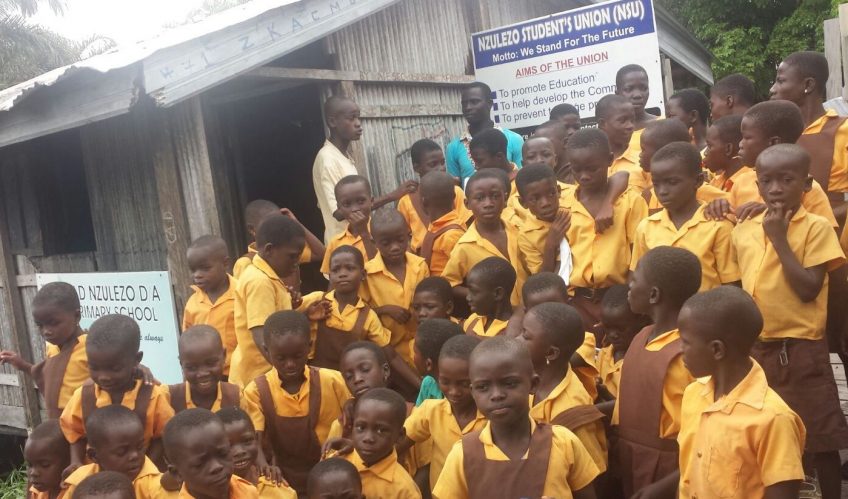
Evans Cudjoe, headteacher of the village’s only primary school says new teachers employed by the government don’t come back after their first visit to the village. Cudjoe, a teacher in Nzulezo for nine years believes they wont have shortage of teachers if the Ghanaian Government provide enough incentives to make teachers stay; like slightly higher pay than in the city and modern school supplies to get their work done instead of constantly spending their own money for supplies.
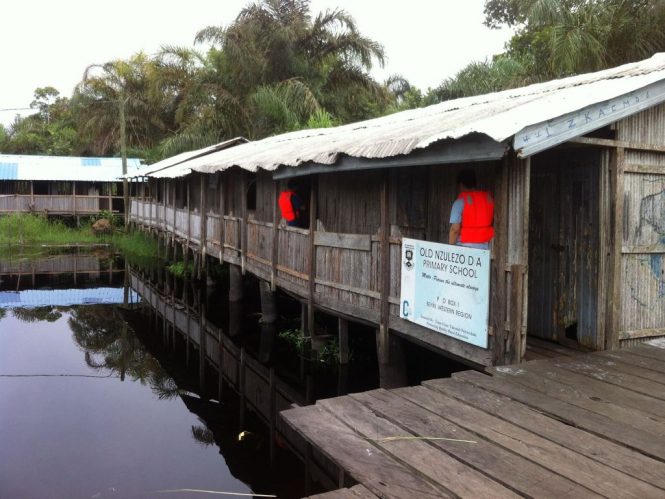
Amidst all the recruiting problems, it is nice to know that the village have produced a lady nurse and a man getting a University education now. Getting those students to come back and support the village is an easier task than getting the government teachers to come to the village to teach. The residents of Nzulezo are very comfortable with their way of life and it’s not as easy as you may think for them either. They tried to balance their modern way of life with their ancient ways; cooking, traveling, entertainment, life’s enjoyment, one with nature, educating their children in the ancient and modern ways just like it’s done on land in Ghana or anywhere around the world.
Traveling Back to the City
Back onto the canoe! There are tro tros (shared taxi vans) available from Beyin to Takoradi.
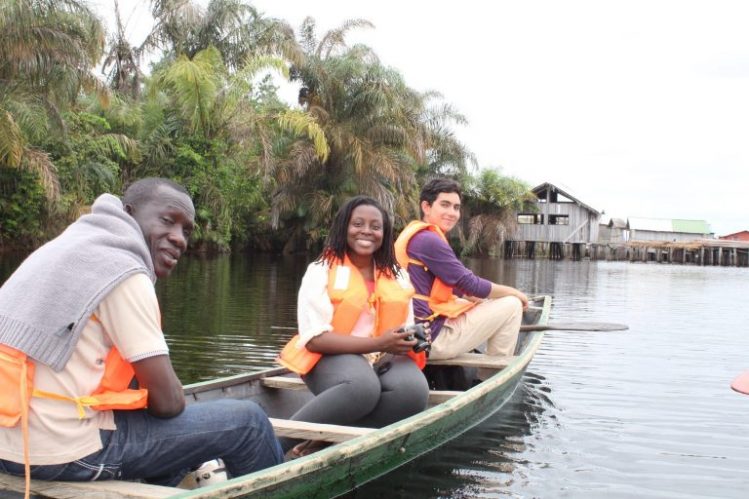
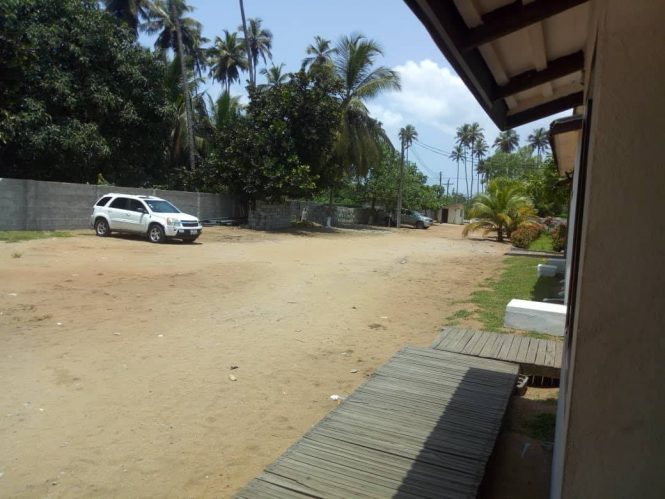
References
Nzulezo is a remote stilt village in Western Ghana.
Nzulezo- The Ghanaian Atlantis Ghana by
![]() Nzulezo – Beyin, Western, Ghana m.me/NzulezoTheVillageOnStilts Call +233 24 115 2811
Nzulezo – Beyin, Western, Ghana m.me/NzulezoTheVillageOnStilts Call +233 24 115 2811



